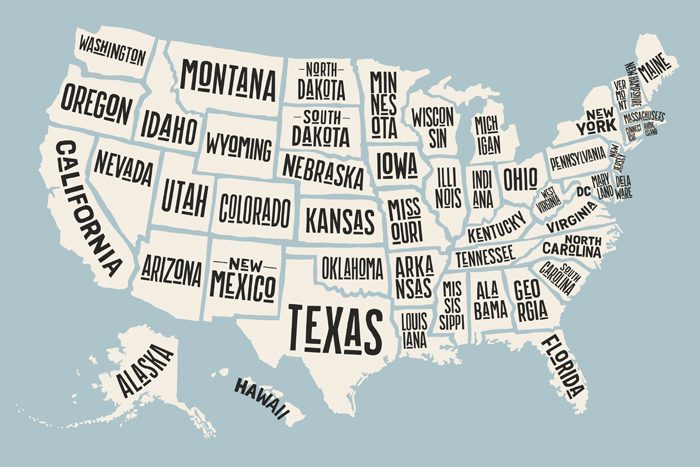Workers’ Comp and Paid Leave Legislative Updates in the West

Workers’ compensation legislation in the West has all eyes on California’s assembly bill 5, which changed the state’s definition of an independent contractor. While that law made headlines, the rest of the region was busy passing new legislation of their own, which will affect everything from first responder coverage for PTSD to state definitions of a compensable injury.
A recent webinar from the Disability Management Employer Coalition (DMEC) dove into all the legislative actions regarding workers’ compensation and paid leave in the West that employers need to know about.
In Workers’ Comp
1) California
Effective: January 1, 2020 and July 1, 2020
The gig economy is expected to take a hit under California’s Assembly Bill 5. The bill codifies the decision made in Dynamex Operations West, Inc. v. Superior Court of Los Angeles. The bill is expected to impact not only the gig economy, but also franchisers, pizza delivery businesses and cleaning services.
Under California law, workers will be considered employees unless they meet all three criteria of the ABC test. Under the test, a worker is considered an employee unless:
A) The worker is free from the control and direction of the hirer in connection with the performance of the work.
B) The worker performs work that is outside of the hirer’s usual business.
C) The worker is engaged in an independently established trade, occupation or business of the same nature as the work performed for the hiring entity.
“AB 5 is really making headlines for its potential impact on the gig economy, but it’s going to have an impact on the many other industries that use independent contractors,”said Scotty Benton, vice president of the workers’ compensation practice at Sedgwick.
“The ABC test will apply to a variety of claims, not just workers’ compensation. You also have claims for overtime, unemployment insurance, paid sick leave, paid family leave, so it will affect a variety of claims.”
For workers’ comp, this means that beginning July 1, workers considered employees under this new test will be eligible for workers’ compensation benefits. Certain professions, including freelance journalists and photographers, lawyers, surgeons and others, are exempted from the bill.
In addition to assembly bill 5, California passed senate bill 542 which provides first responders with workers’ compensation benefits while they recover from a mental health condition.
2) Washington
Effective: July 1, 2020
New regulations from the Washington Department of Labor and Industries amended several out of date and inefficient rules in order to provide better communication with injured workers and greater certainty to employers throughout the claims process.
Under the new regulations, self-insured employers will no longer need to maintain a manual claims log book.
Instead, they will be able to use purpose-driven, department-developed forms which can be submitted either electronically or on paper.
The updated regulations also include mandated communication templates for employers to use to share information about benefits and authorizations with injured workers.
Additionally, the regulations require anyone making claims management decisions outside of the state of Washington to be a certified claims administrator.
3) Oklahoma
Oklahoma passed a major, comprehensive piece of workers’ compensation legislation that aims to address issues created by senate bill 1062, which was passed in 2013.
The bill, house bill 2367, addresses everything from increasing the maximum amount of time an injured worker is entitled to temporary total disability benefits to changing the definition of a compensable injury.
Here are some highlights from the bill:
- The definition of a compensable injury will now require that the major cause is an accident, cumulative trauma or occupational disease. Accidents involving alcohol, illegal drugs or prescription drugs not used according to a physician’s order will not be considered compensable.
- Workers are now entitled to 156 weeks of temporary total disability leave.
- Allows an employer to file a claim for benefits for up to six months after an injured worker has received benefits.
4) Idaho
Effective: July, 1 2019
Idaho is one of five states in the region that passed legislation regarding PTSD and first responders, following a broader national trend.
“Most people agree that these bills are the right thing to do, but they also acknowledge that we don’t know the costs that are going to be associated and it might be a huge price tag for employers,” Benton said.
Under senate bill 1028, certain psychological injuries affecting first responders will now be compensable under workers’ compensation.
5) Nevada
Effective: June, 3 2019
First responder employment agencies must now provide educational training on mental health in Nevada.
The state’s assembly bill 492 revises the circumstances under which a first responder or an employee of the state or local government can receive benefits for stress-related conditions.
In addition to introducing education requirements, the bill also exempts claims for certain stress-related injuries from prohibitions on injury and temporary disability compensation.
6) New Mexico
Effective: April 2, 2019
In New Mexico, house bill 324 now recognizes PTSD as a condition caused by employment as a firefighter and thereby allows it to be covered under workers’ compensation policies.
Like other bills, this requires the condition to be diagnosed by a physician or psychiatrist and it requires employers to provide mental health education to employees.
7) Oregon
Effective: June 30, 2019
Oregon’s senate bill 507 would consider PTSD a compensable occupational disease for first responders and corrections-related employees who have spent at least five years in their job and work for a public entity.
Employees in these fields may also receive workers’ compensation benefits for PTSD if they have experienced a single traumatic event.
For compensation, all employees need to receive a diagnosis from a psychiatrist or a psychologist.
In Paid Leave
1) Colorado
A paid family medical leave program in Colorado may arrive as soon as 2024.
A bill was planned for this year, but after concerns about the potential costs, the state decided to pass senate bill 19-188, which authorizes a study on the potential effects of a paid family medical leave program on the state.
After the study, sponsors plan to return their bill next year with program benefits expected to begin in 2024.
2) Nevada
Effective: January 1, 2020
Nevada’s senate bill 312 provides employees with a paid leave of absence for any or no reason.
“This means the employee can accrue time off … and they do not necessarily have to give a reason. It could be for vacation, because they’re sick, for a family member,” said Megan Holstein, senior vice president of absence and claims product at FINEOS.
“This is a trend we’ve started to see this year in 2019. Instead of seeing sick and paid leave laws, we’re starting to see laws that allow paid time for use for any reason.”
Employers with 50 or more employees are covered under the bill and employees are eligible for the benefit after 90 days of employment. Employees incur .77 hours of leave for every 40 hours worked.
3) New Mexico
Effective: June 14, 2019
Employees in New Mexico may now use their sick leave to care for a family member under senate bill 123.
The bill states that private employers who provide paid sick leave must allow employees to use their accrued leave to care for an approved family member.
Currently the bill lists spouses, domestic partners, children, parents, grandparents, great-grandparents, grandchildren, great-grandchildren siblings, aunts, uncles, nieces and nephews as approved family members.
4) California
Effective: July 1, 2020
California’s senate bill 83 expands the state’s paid family leave program. The bill now offers eight — rather than six — weeks of benefits. Qualified family members and reasons for leave remain the same as they were under the pre-existing law.
Other bills that affect paid leave in the state include assembly bill 1748, which amends the California Family Rights Act requirements for flight crews to be in line with the Federal Family and Medical Leave Act, and assembly bill 1223 allows organ donors an additional 30 days of unpaid leave in addition to the 30 days of paid leave they can receive.
5) Oregon
Effective: Payable in 2023; Deductions begin January 1, 2020
Senate bill 2005 introduces a paid family and medical leave program in the state in addition to the state’s family leave act.
Employees in the state are now entitled to paid family leave benefits and job protection if they take family, medical or safe leave.
Safe leave is similar to the policies in other states that allow employees to take leave if they are victims of physical or domestic violence. States in the northeastern and southern regions of the U.S. have enacted similar laws.
6) Washington
Effective: Benefits take effect January 1, 2020; Regulations take effect December 20, 2019
Washington amended its paid family medical leave law with substitute house bill 1399.
The bill allows employees to use their paid time off, sick leave and vacation time on top of the PFML benefits.
The bill also added language to clarify that the seven-day waiting period for leave is seven calendar days, not business days of leave, among several other provisions.
Trends to Watch
Like states in the Northeast and the South, western states are trending towards including more provisions for first responders in their workers’ compensation laws. Drug formularies and opioid litigation is also popular in these states.
In addition to those national trends, western states are also introducing or considering legislation on the following issues:
1) Marijuana: It’s no surprise marijuana legislation — medical and otherwise — is popular in the West. Six states in the region — Colorado, California, Oregon, Washington, Nevada and Alaska — have fully legalized marijuana and two states in the region have introduced laws concerning the use of the drug in workers’ comp.
In Hawaii, the failed house bill 1534/senate bill 1523 would have made medical marijuana reimbursable under the workers’ compensation system for patients registered with the Department of Health’s medical cannabis program. The bill did not pass.
Utah, on the other hand, passed legislation regarding the use of medical marijuana within workers’ comp. Their senate bill 161 will allow insurers to provide workers’ compensation insurance for workers in cannabis production establishments or medical cannabis pharmacies.
2) Network Transparency: California passed senate bill 537, which seeks to address issues of network transparency that exist throughout the region.
“We believe that this bill, while California-centric, is going to be sort of a trending piece for multiple other states,” Don Lipsy, director of networks at Sedgwick.
“There’s been a long-term, growing concern, especially among the payer and provider community, that discounts aren’t always being communicated effectively and in a transparent nature, particularly when it talks about some of the more hidden aspects of costs.”
The big question these bills will seek to address, according to Lipsy, is “Will there be a greater need for, or facilitation of transparency of rates?”
Given that California can be a bellwether for other states, it will be interesting to see if similar laws are enacted in 2020. &

Click here for updates in the Northeast, South or Midwest.










